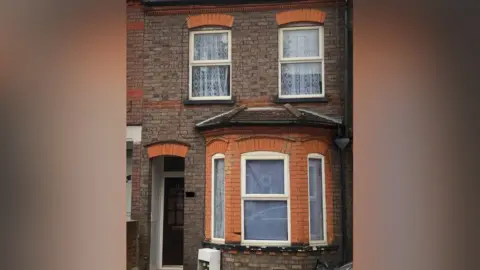Luton 'stolen' house owner still fighting to get home back
 BBC
BBCA man is still fighting to get his house back more than a year since it was sold without his knowledge.
Reverend Mike Hall previously told the BBC of his shock at returning to his Luton house and finding it stripped of all furnishings in August last year.
He is still working to obtain compensation for the loss of his property and has been unable to regain formal ownership of his house.
A Bedfordshire Police investigation remains ongoing.
Mr Hall, who bought the property in 1990, was working in north Wales on 20 August 2021 when he received a call from his neighbours alerting him that someone was in his house and all the lights were on.
He drove home to find building work under way and a new owner who said he had bought the house.
"I tried my key in the front door, it didn't work and a man opened the front door to me - and the shock of seeing the house completely stripped of furniture, everything was out of the property."
Impersonation
BBC Radio 4's You and Yours programme obtained the driving licence used to impersonate Mr Hall, details of a bank account set up in his name to receive the proceeds of the sale, and phone recordings of a man claiming to be Mr Hall instructing solicitors to sell the house.
Once the house was sold to the new owner for £131,000 by the person impersonating Mr Hall, they legally owned it.
As well as Mr Hall fighting to regain ownership, the BBC has learned that over a year later, the new owners are contesting Mr Hall's appeal to have the house transferred back into his name, which may result in a legal tribunal before any decision is made.
Mr Hall said: "Back in September [2021] I made that application with the Land Registry giving full details as I see it.
"They then processed that and are still processing it. Conversations with Land Registry have been very protracted if I'm honest with you and as it stands today, more than 12 months down the line, they are still waiting to decide whether, as I wish, if the house will be transferred back into my name."
 Getty Images
Getty ImagesSince the initial BBC report, further victims have come forward to share their experiences.
Four weeks before Mr Hall's discovery, Angus Penfound's property in Southampton was also sold without his knowledge.
Mr Penfound bought his late Victorian three-bedroom terraced house for £180,000 in 2018.
After securing work in Cornwall, Mr Penfound took the decision to rent the property out via a local estate agent.
A criminal calling themselves Stephen Jones took up the tenancy and paid the rent and council tax. They never moved into the property, but used access to it to sell on for £196,000 - well below market value.
"It wasn't until Southampton Council phoned me to tell me that someone else was living there and am I aware of this," said Mr Penfound.
"I went back to them and said, 'No', and I got on to the estate agent straight away. One of the managers phoned me and told me they believed the property had been sold and that they couldn't do anything to help me."
A claim to the Land Registry for compensation is in progress.
'Very alarmed'
The BBC has seen Land Registry information which shows that in 2021-22 it paid nearly £7m for 598 claims to their indemnity fund, which is used to help compensate instances of fraud, compared with £5.44m for 540 claims in 2020-21.
Mr Penfound's MP Caroline Nokes said she was "very shocked to hear about the case and very alarmed to hear it wasn't the only case".
"I'm very sad to hear that it seems the Land Registry doesn't seem to have caught up with 21st Century identity theft."
Responding in Parliament on 20 October, Leader of the House, Penny Mordaunt, said: "I know that [Ms Noakes] has been doing a lot to put a rocket up the Land Registry. I want to assist her in doing that and I will write to the Secretary of State".
A spokesperson for the Land Registry said it took "property fraud very seriously, recognising that it can be extremely distressing for those affected".
"In the unfortunate event of a fraudulent transaction, there will normally be at least two victims. In most instances, the property is obtained by an individual in good faith believing it to be a wholly legitimate transaction. If that is the case, the property cannot be simply transferred back to the original owner, without further harm to that party.
"Where possible, we will restore ownership to the original owner, but in cases where the original owner was not living in the property at the time of the fraudulent sale (perhaps because they were renting it out), and an innocent party has purchased and then occupied the property in good faith, it is more likely we will allow the current occupier to continue to live in their new home and to offer financial compensation to the original owner.
"This would be in line with the guiding principles set out by the legislation.
"We try to do this as quickly as possible, but it can take some time to obtain all of the necessary facts, and consider them appropriately."

Find BBC News: East of England on Facebook, Instagram and Twitter. If you have a story suggestion email [email protected]
